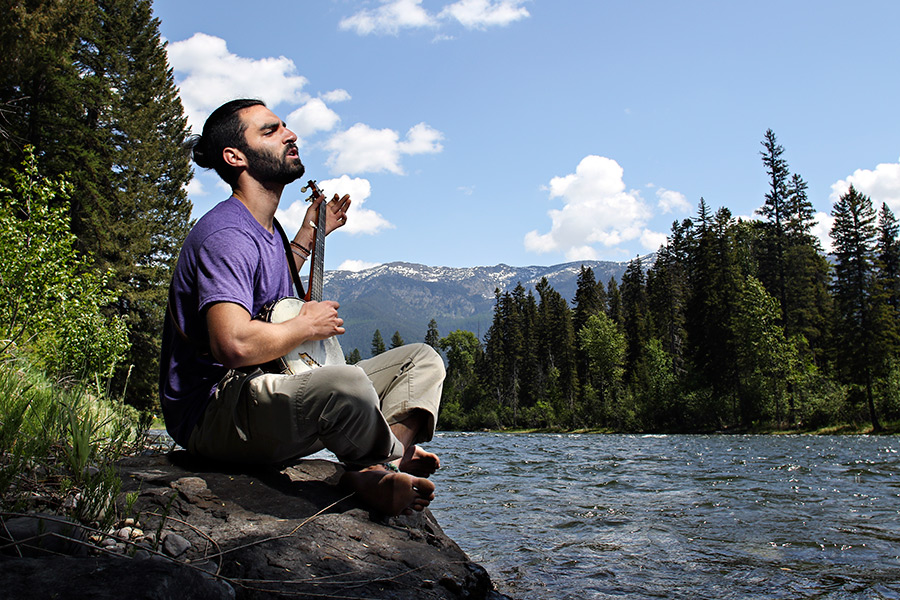Chris Kammerer drew the inspiration for his new album from just beyond his backyard, where the budding green branches of a willow tree drape the banks of the Swan River hushing past, and the twang of a banjo echoes through the valley.
Crafting songs from this idyllic setting, the Bigfork singer-songwriter recently released his first album under the handle “Old Sap,” and the debut recording, fittingly titled “The Swan,” is peppered with original songs about the interplay of beauty and pain in nature and in life, all of which is displayed prominently in the view from his porch.
“A lot of the imagery in my songs comes from this setting and resonates with this view,” Kammerer, 26, said on a recent sun-soaked afternoon, strumming his banjo on the riverbank.
The musician’s home on the Swan strikes a romantic tableau of a lone poet cobbling together verses and braving the world with only the company of his banjo, but Kammerer is quick to acknowledge the heaps of help he received on the album from more than 20 musicians from throughout the Flathead Valley.
Produced by Marco Forcone, who also plays drums on “The Swan,” the record includes musical accompaniment by Don Caverly, Jesse Maw, Alex Hogle, Bethany Joyce, and Mellow Waters, and the album jacket’s imagery is shot by photographer Kevin Porto, who is also Kammerer’s roommate.
“Old Sap is a fluid concept. It’s whoever is around to tell the story,” Kammerer said.
But the lyrics and songs belong to Kammerer, and they combine to offer a range of musical expression that wanders between musings about nature’s cyclic harmony and the love and anguish inherent to the human condition.
The verse that opens the album, “Let’s have a fire and sing about those timeless things,” stands as the album’s “thesis statement,” Kammerer said, and the record is divided conceptually into songs about the reciprocation of life and death in nature, and “human relationships and how we hurt one another.”
He said teasing back and forth between the painful strains of reality and the playful joys of life and nature invigorates the emotional punch of his songs.
“You can’t make me cry just by throwing tragedy after tragedy at me. You have to make me laugh first,” he said. “My strongest artistic moments come when I’m pinned to the wall and I can’t move and here comes the blade and it’s so horrific and cathartic at the same time that the whole gamut of emotions is being channeled.”
The song “The Way It Goes” begins with a descriptive scene whose headspring was clearly born of the Swan River, while “Guiltiest Man Alive” has its roots in Kammerer’s experiences growing up in Catholic school near Chicago.
“This morning the river was all clear and green, sunlight graced the pine that kissed the snow. On the river drifted ice broken off from far upstream, follow the way it had to go,” begins “The Way It Goes.”
“All these little golden things, bind the flower to the bee,” goes the chorus. “I can’t tell you how to keep your mind, your way is yours to find.”
Kammerer’s songwriting skills are hard-earned, and were honed through his academic background as much as his musical influences. He received a Bachelor of Arts in acting and writing from Washington University in St. Louis, and has been writing poetry and performing spoken word since he was a teenager.
“I’ve been writing for so long that I feel very confident in my ability to put a story to a melody,” Kammerer said.
Voice and acting lessons during college helped instill in him the cowboy-sweet timber that rambles through his songs, as well as the physical charisma that make his performances so engaging – when Kammerer hits a high note or growls out a lyric, his expressive face transforms and his open jaw yaws sharply to the side.
As a self-taught musician, Kammerer began playing the banjo less than five years ago. He developed his skillset while performing at an open-mic in Whitefish, where Forcone and Caverly offered him sage performance advice and encouraged him to continue pursuing music.
“Those guys have been my biggest mentors in the valley,” Kammerer said. “When I started showing up to open-mic I wasn’t very good, and they encouraged me to keep at it.”
With the mindset of a poet and spoken-word artist, Kammerer was inspired to learn how to play the banjo after watching a performance by Scott Avett of The Avett Brothers in Normal, Illinois.
“I watched him just wail on the banjo for nearly four hours and that’s when it clicked,” he said. “I was obsessed with Americana music, and you can’t get anymore Americana than the banjo.”
A year ago, Kammerer decided to begin writing and performing music full time, and with the release of “The Swan” – and a repertoire that includes around 50 songs that have yet to be recorded – he plans to ramp up his touring in the region.
“I still haven’t had to ask my parents to help out with rent,” he said. “I’m still trying to figure out how to dial in the most productive work-lifestyle flow, but I’m excited about all of the tour dates on the calendar.”
Digital downloads of “The Swan” are available on Bandcamp and at www.oldsapmusic.com, which also has a schedule of upcoming performances by Old Sap.
